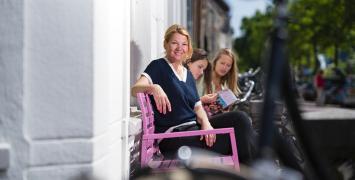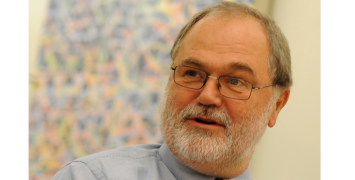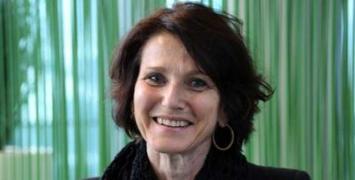ERC Scientific Council member Michel Wieviorka departs

Michel Wieviorka has worked with the ERC since January 2014. This year, his mandate will come to an end, so we got together to talk about his life work and his time at the ERC.
Prof. Wieviorka, you do many things - you are a researcher, a member of several organisations and you are often take part in the public debate - how would you describe yourself?
I am a sociologist who considers that social sciences must participate in public debate and that researchers have institutional responsibilities with regards to society.
When did you become interested in sociology in the first place?
My first wife was a sociologist. I was not. I had been to business school. But she spoke to me about things that were so much more interesting than the ones I was studying. After that, I had the chance to discover a book by Manuel Castells, who at the time was studying the sociological aspect of the urban context. I got in contact with him and he really opened to door for me. Then I had to make a choice about what studies to pursue for my doctorate, and well, I chose the social sciences.
And what did you focus on after this transition?
My first interest was the study of social movements. On the one side, the new movements that emerged after May 1968, like the student movement. On the other, the struggles of workers, the trade unions. I wanted to understand both their sociological and historical nature. It was a time, the beginning of the 70s, when we saw a transition from an industrial society to a post-industrial one. Through these movements, I was trying to understand the emergence of this new society, but also analyse the main actors of a society that was exiting the stage and becoming something of the past. All this led me to focus on many currents, in particular on the Polish organisation Solidarność.
Then what happened?
In this context, I was able to meet some former extreme-left terrorists from Italy. They were staying in Paris and were interested in reflecting on their actions. I interacted with them a lot and it was fascinating work where we really used the sociological intervention method. I organised a seminar on what I had discovered, and one of my students pointed out I should also focus on other forms of terrorism and armed struggle. For example, he suggested I work with nationalist groups such as the Basque group ETA. He had some contacts and I was able to penetrate the organisation. This led me to study these movements for the next ten years.
Ten years of trying to understand different types of terrorism, as well as terrorism as a whole. At the time I was one of the few sociologists to conduct field studies, to meet these people and really focus on talking to them and building a rapport.
You mentioned that you often inform public debate on these topics. Why do you think this type of engagement is so important?
There are two ways of addressing the engagement issue for a social scientist. In one, you can consider discussing with colleagues and scholars but not taking part in the public debate. This is definitely respectable. These people feel like outsiders and don’t like to mingle, but are not necessarily bad citizens in their daily life. They are just not engaged in their role of researchers. I am part of the second category. I think it’s important that someone in my position brings some insight into the problems of today’s world that concern the topics I have spent years researching. I have had the chance of studying problems like terrorism throughout my career, it’s normal that I would intervene so that the debate is made by the people who have investigated the issue, and not by uninformed actors. I see it as a civic-minded attitude, especially as I am a public servant and my work has been financed by public institutions.
And you see your role in the ERC in this optic?
The ERC is another context. During my work at the ERC, I have had the possibility of representing the social sciences. What I think I bring to the ERC is the voice of a sociologist in a conversation where social sciences deserve to have their say. In other institutions this is not always the case. Working in a multidisciplinary environment is very important. If I participate to an open access or a gender working group, which are the groups I was most involved in, I know I will bring my experience as a social scientist but I will also take part in discussions that have a universal value, because they represent the view of chemists, biologists, mathematicians, engineers.
The ERC is also the factory of a new generation of scientists.
Our responsibility is to help future researchers, making sure that the most deserving receive the grants. Plus it is a truly European organisation, which provides international opening, on Europe but also beyond. It’s the refusal to focus on the national context alone. Finally, I appreciate the idea that researchers must be free. The “bottom-up” approach which is at the core of the ERC isn’t always there in other organisations, and must be supported. Researchers, for example, can decide where to conduct their work, what institution to be based at and how to manage their funding. It’s powerful, it’s freedom.
What did you learn that was unexpected?
I’ve learnt a lot, I would even say, with a bit of embarrassment, that I took a lot more than I gave. I saw what it means to discuss clever solutions, to prepare the ideal conditions for evaluations to be run smoothly and researchers to thrive. I’ve seen how the Agency can cooperate with the Scientific Council. This administration is not a bureaucracy. It’s an administration where people are constantly producing information, where they are also producing knowledge, where they are mobilised and love what they do. Many times, I was handed something well-thought to read about the functioning of panels, the results of the evaluation, the evolution of disciplines. I have benefited from this a lot. Two years ago, the French Minister for Higher Education, Research and Innovation asked me to produce a report on the place of French social sciences in Europe, and it is the knowledge I obtained at the ERC that allowed me to carry out that task.
How did you work with the ERC?
Very well, I even have friendships that were born during my work in the agency! I found that there was an understanding of what research is, that I would like to see in many other places. I found wonderful people, competent, available, it was a period of great harmony. Of course, there must have certainly been difficulties, but I never felt them. And then there is this feeling that between the Agency and the Scientific Council there was a real community
What will you miss most of your time as Scientific Council member?
I will miss the whole experience very much! I like the plenaries, the moments of conviviality, the informal exchanges. We feel we belong to an extremely broad and important environment - to have known some of the most brilliant researchers in the world, to have a simple direct relationship with them, to have been pushed to listen, to have argued some ideas. Every two months it is a wonderful meeting. In addition, the ERC has helped me to feel fully European, which is very important. At the ERC one is really keenly aware that what we are doing is for Europe and its future, whereas when one is in Paris in an office, the story seems quite different.





